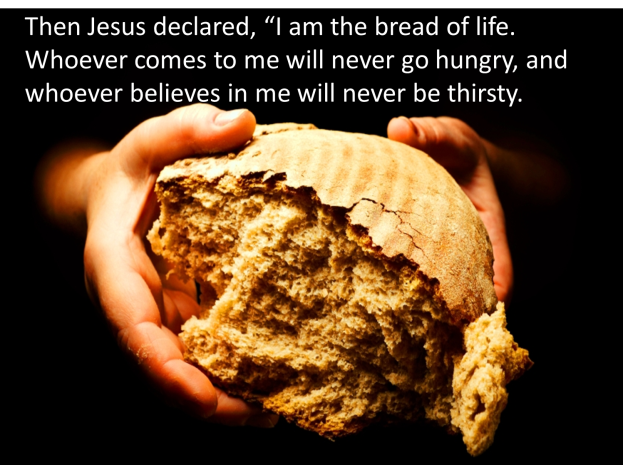In the Gospel readings over the past two weeks we have heard Jesus say these words: “I am the bread of life. Whoever comes to me will never be hungry, and whoever believes in me will never be thirsty.” And over the Summer period the lectionary asks us to spend time in John 6. Sunday’s Gospel readings seem to have become repetitive – almost too repetitive. Why do we spend so much time focussing on this one chapter of John’s Gospel?
John’s Gospel does not have the story of the Last Supper and the institution of Holy Communion. Where the other Gospels focus on that story, John chooses to highlight Jesus washing his disciples feet. It is here, in John 6, a passage that commences with the feeding of the 5000 that John chooses to reflect on the importance of the Communion meal of bread and wine to his first readers.
We reflected in my post: “God loves and calls us all” ( http://wp.me/p45mBO-mw) that as physical beings we need food and drink to survive. John wants us to understand that our participation in Holy Communion is just as important to our survival as spiritual beings.
All of us, although we might not want to admit it, are really quite fragile. We all have needs and longings at the core of our being which need to be fulfilled. So many of us feel driven to try to fulfil these longings for significance, for meaning in our lives. It’s part of the human condition! We long for our deepest needs to be met and we search for ways to make this happen! These needs are spiritual – but in the end they are also physical. For when these needs are not met our physical well-being is compromised. We encounter and suffer from depression, or the stress we feel opens up the possibility of heart attack, or arthritis. The physical and the spiritual cannot be separated.
Jesus says to us all: “I am the bread of life. Whoever comes to me will never be hungry, and whoever believes in me will never be thirsty. … Whoever feeds on this bread will live for ever.” Or to put it more succinctly, “I am all you will ever need.”
John is so concerned that we grasp this message that he places Jesus cryptic words about Holy Communion alongside the story of Jesus meeting the physical needs of the crowd in feeding the 5,000. John is saying to us: “See, just as Jesus met physical needs he can meet spiritual needs as well.” God is interested in everything that makes up who we are, there is no distinction between physical and spiritual. In God’s eyes it is all one.
And John wants us to grasp that participating in a meal together is deeply significant for our spiritual and physical well-being. When we eat together, we do so much more that satisfy physical hunger and thirst. Eating together speaks volumes about our relationships. When we share a meal together we say very clearly to those we are with: “You are worth sacrificing time for.” When we invite friends round for a meal we really are valuing them. So often it is sharing a meal together that cements friendships and relationships – whether it be the marriage breakfast, or the business lunch, or any other kind of meal. Eating together either creates or cements those bonds of commitment.
So, when we share Holy Communion together we cement our relationship with God and our relationships with each other. We enact, in a way that physically affects us, the drama of Jesus’ death. We take into ourselves again the signs of that passion. We receive again the physical signs of God’s love for us and as we do so we are renewed and we’re strengthened for all that life can bring our way.
Jesus says: “I am the bread of life. Whoever comes to me will never be hungry, and whoever believes in me will never be thirsty.”




 For Christians, there is also an overwhelming response of joy to the unbelievable truth that each of as individuals is loved by God and that we together are God’s people, loved and accepted by him. Paul says that the natural outworking of that joy is worship
For Christians, there is also an overwhelming response of joy to the unbelievable truth that each of as individuals is loved by God and that we together are God’s people, loved and accepted by him. Paul says that the natural outworking of that joy is worship  and loving service. We respond in worship and service. We use the gifts that God has given us as part of God’s on-going mission in the world. We give of ourselves to others, just as God in Jesus has given himself for us.
and loving service. We respond in worship and service. We use the gifts that God has given us as part of God’s on-going mission in the world. We give of ourselves to others, just as God in Jesus has given himself for us.